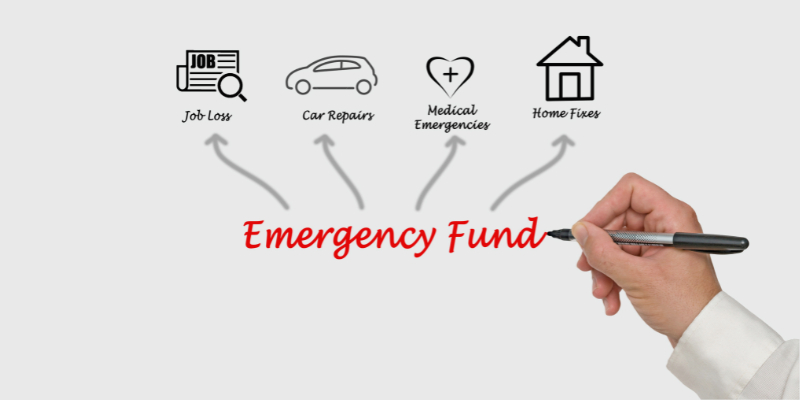In theory, most of us know that it’s a good idea to have some money put aside for a rainy day. In practice, however, it can be difficult to build up the funds that you’ll need in the event of a financial emergency.
Such emergencies can take the form of unexpected expenses—like a hospital stay or having a tree fall on your house—or a reduction in income, such as losing your job or having an extended illness that prevents you from working.
While the right kind of insurance can cushion the financial impact of such emergencies, having emergency funds to offset unavoidable costs is an essential aspect of your overall financial security.
In this blog post, we will discuss what an emergency fund is, the benefits of having an emergency fund, how to determine the right amount of money to put into an emergency fund, how to build an emergency fund, and how a bank can help you achieve this important financial goal.
What Is An Emergency Fund?
An emergency fund is any money put aside for unexpected expenses or events, such as emergency medical expenses, home repairs, job loss, natural disasters, or any other unexpected financial need. Life is unpredictable, and an emergency fund can provide a financial safety net to help you and your family stay afloat during difficult times.
These emergency funds should be kept separate from the rest of your money — both the money you spend regularly and the money you save to reach long-term financial goals. Ideally, a proper emergency fund should not be the same thing as a regular savings account. Regular savings can be applied to any number of financial goals, but an emergency fund should be kept strictly for emergencies.
It should also never be used for leisure or luxury expenses, such as vacations or shopping.
An emergency fund should be easy to access in case of an emergency, and it should also have the potential to earn interest. An account with a low-risk and liquid investment option, such as a high-yield savings account, is ideal for emergency funds.
How Does An Emergency Fund Benefit You?
There are many benefits to having a dedicated emergency fund. When you have money set aside to cover unexpected expenses, you can:
- Avoid going into unplanned debt: with enough emergency funds, you won’t have to take out a loan or use credit cards to pay for unexpected expenses.
- Preserve your credit score: when you don’t have to go into debt due to an emergency, you’ll be able to avoid high-interest emergency loans and keep your credit score from taking a hit.
- Avoid dipping into other savings: with emergency funds, you can protect your investments, future retirement money, and other savings from getting used up in the event of an emergency.
Another benefit of having an emergency fund is that it can provide peace of mind. Knowing that you have money set aside to cover unexpected expenses can help reduce your stress and worry.
How Much Money Should You Put Into Your Emergency Fund?
If you want to build up an emergency fund for yourself, you might wonder “how big of an emergency fund do I need?” Any money put aside for unexpected expenses or events is a good thing, but the amount of money that you need to feel true peace of mind may vary.
Experts say that you should have around 3-6 months’ worth of living expenses stored in your emergency fund. The exact amount of money you’ll need will therefore depend on your average cost of living, as well as other factors such as your current income streams and level of risk for an emergency.
For example, if you have a stable job and little to no outstanding debt, you might feel comfortable tapping into other savings or using credit cards as a temporary solution in case of an emergency. If this is the case, you may choose to set aside only around three months of living expenses in your emergency fund. On the other hand, if your employment is less stable or you have multiple loan or credit card payments due each month, you may want to save closer to six months of living expenses, since you might have less cash readily available at any given moment.
Similarly, you’ll want to put more into your emergency fund if you are at higher risk for certain types of emergencies. If you have a chronic medical condition or hobbies that involve a risk of accidental injury, you may want to save more for any possible medical expenses that you might need to cover. Factor in how much your insurance will likely cover, your deductible and out-of-pocket maximums, and ensure that you have emergency funds sufficient to protect your finances if something does happen.
How Can You Build an Emergency Fund?
Whatever amount you need to save to reach your goals, remember that you don’t have to save up all of the money for your emergency fund at once. You can start small and gradually increase your savings over time.
First, set aside a predetermined amount of money each month, according to your budget. You don’t have to save a large amount every month — even a small amount can add up over time. Consistency in saving is the key.
As you save, cut back on unnecessary expenses and reduce your day-to-day spending. This can help to free up more money to put towards your emergency fund. You might also look for ways to make some extra money.
Once you’ve got money coming in that you can save, you’ll want to keep it in a low-risk and liquid investment option, such as a high-yield savings account. This way, your emergency funds will accrue interest and grow, while still remaining easily accessible in the event of an emergency.
How Can a Bank Help You Build Your Emergency Fund?
A bank can help you to manage and grow your emergency fund. Certified financial professionals can provide guidance and advice on how to save and invest your money for maximum returns.
A bank can also help you to open a high-yield savings account. As previously mentioned, these can help your money grow faster while you’re not using it. This type of account typically earns more interest than a regular savings account and can help you reach your savings goals faster.
If you’re looking for a bank to help you manage and grow your emergency fund, TAB Bank can help. We offer high-yield savings accounts with competitive interest rates, no minimum deposits, and no caps. Let us help you open a high-yield savings account to quickly secure and build your emergency fund.
Let TAB Bank help you to plan ahead and save for unexpected expenses or events. With the right tools and guidance, you can easily build an emergency fund and achieve financial stability.


